'I assume Ramachandra Guha's neglect of this aspect of Gandhi grows out of the belief that Gandhi's life had no central text,' says Rudrangshu Mukherjee, professor of history, Ashoka University.
Illustration: Dominic Xavier/Rediff.com
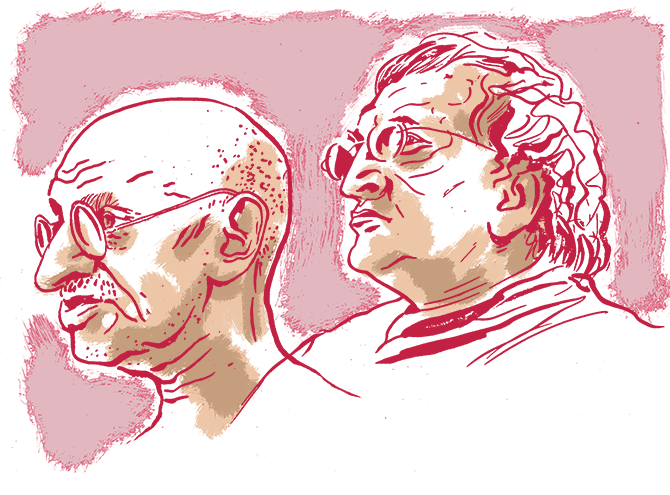
This review must begin with a disclosure. Ramachandra Guha is a close friend, and we have shared our intellectual interests and argued about them for over four decades.
This review will unavoidably carry signs of the friendship, but our intellectual camaraderie also emboldens me to articulate some criticism and reservations about what is a magisterial biography of Mohandas Karamchand Gandhi.
A biography, by convention, crafts a chronological narrative since the life of an individual unfolds in a linear fashion over time.
Before Guha embarks on his chronological and very detailed reconstruction of Gandhi's life in India (after he returned from South Africa), he introduces us to what he describes as the four 'callings' of Gandhi.
These, he says, were the transformation of Indian politics by making the Congress the principal vehicle to deliver India from British rule; the forging of harmonious relations between India's religious communities; the eradication of untouchability; and the impulse to develop economic and moral self-reliance among Indians.
Guha's book seeks to track Gandhi's life and arguments across these four arenas.
He reconstructs Gandhi's life in meticulous detail, based on many years of monumental and global archival work.
This enabled him to unearth aspects of Gandhi's life unavailable to earlier Gandhi scholars who have relied much too exclusively on the 100-volume Collected Works of Mahatma Gandhi.
Gandhi, Guha tells us, popped up at him in unexpected and obscure places. A biographer inevitably stalks his subject; but Gandhi seems to have followed Guha as much as the other way round.
The vast scope of his research enriches Guha's narrative in extraordinary ways.
To take two examples from the innumerable that could be cited. There are many accounts available of Gandhi's Dandi March, but Guha embellishes his account of the very well-documented event by picking out one moving detail.
The Ananda Bazar Patrika reported that at a village called Dehwan a 105-year-old woman greeted Gandhi by putting red tilak on his forehead and telling him to return only after he had won swaraj.
A simple detail reveals how common people perceived the Mahatma. The other pertains to another well-known episode of Gandhi's life -- his decision very late in his life to sleep in the same bed with his grand niece, Manu. Guha appositely calls it 'the strangest experiment'.
He illuminates his account of this with quotations from Gandhi's stenographer who vehemently objected to this attempt on Gandhi's part to test his brahmacharya. And another from a hitherto unknown letter that brings a completely new perspective to this experiment through which Gandhi wanted to demonstrate that 'men and women could so purify themselves in mind and spirit that they could share a bed without either being put to shame'.
Who else but a scholar with an obsessive interest in sources and an ethnographer's eye for detail would have unearthed and used such reports? These examples illustrate this biography's fundamentally different approach even as they suggest to us where this biography breaks new ground.
Guha's Gandhi lies in the details.
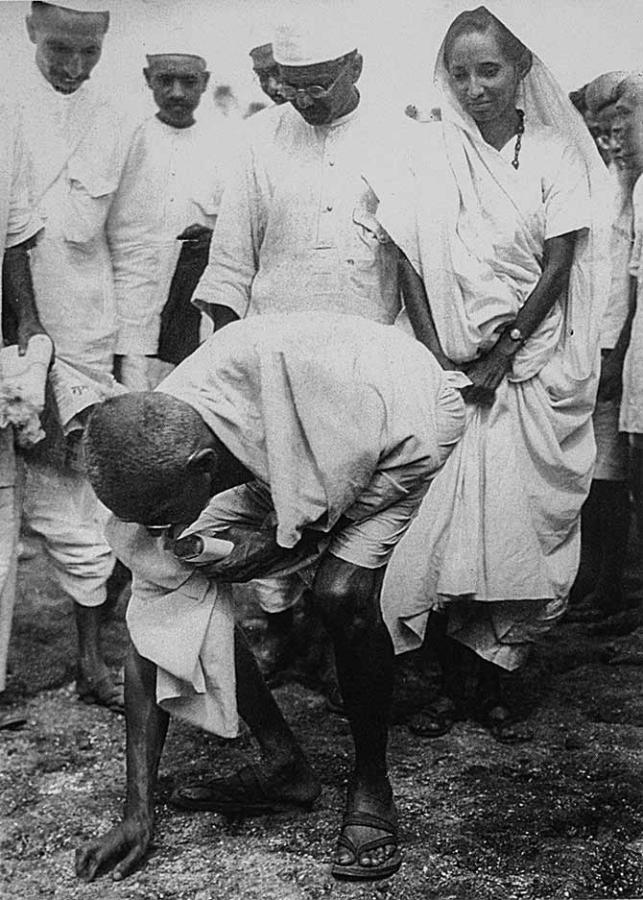
Paradoxically, the great strength of Guha's book is also its principal weakness.
No serious historian can avoid looking at archives and documents, but these repositories have a lure of their own and a historian needs, at some point, to resist their weight from overwhelming his narrative.
Factual detail has to be carefully sieved, the grain of detail that serves a story removed from the chaff of detail that can take over the narrative at the cost of interpretation and meaning.
Guha's biography runs perilously close to this faultline. The details are fascinating but at times one is left wondering how well it all stacks up.
I have one other related criticism. The sources that Guha unearths and consults relate to Gandhi the activist, the politician, and to Gandhi as he related to the external world.
But was this the only facet of Gandhi?
He was above everything else a man driven by a moral vision.
His life was also a spiritual quest -- 'an experiment with truth'. This is a biography that does not investigate Gandhi's interiority.
What ideas informed his inner life?
How did they impact his actions?
We need greater access to Gandhi's inner life than Guha provides since Gandhi did not believe that there was a dividing line between his deeds and his ideas. 'My life is my message,' he said.
Guha begins his book, as I said, by noting what he called Gandhi's four callings.
Actually, those four areas of his activities were derived from even more profound callings -- the real pillars of his inner life.
He spelt them out with great clarity in many of his writings, most importantly in Hind Swaraj.
These were an unfailing commitment to a simple life, to abhaya, to ahimsa, to Hindu-Muslim unity and to truth.
He never wavered from these ideals. Guha rather underplays this because he refuses here (as well as in its predecessor) to engage with Hind Swaraj and the ideas contained in it.
This seems to me a puzzle. I assume Guha's neglect of this aspect of Gandhi grows out of the belief that Gandhi's life had no central text.
The difficulty with this view of the matter is that it runs against Gandhi himself: The Mahatma considered the ideas in Hind Swaraj to be inseparable from his life and his work.
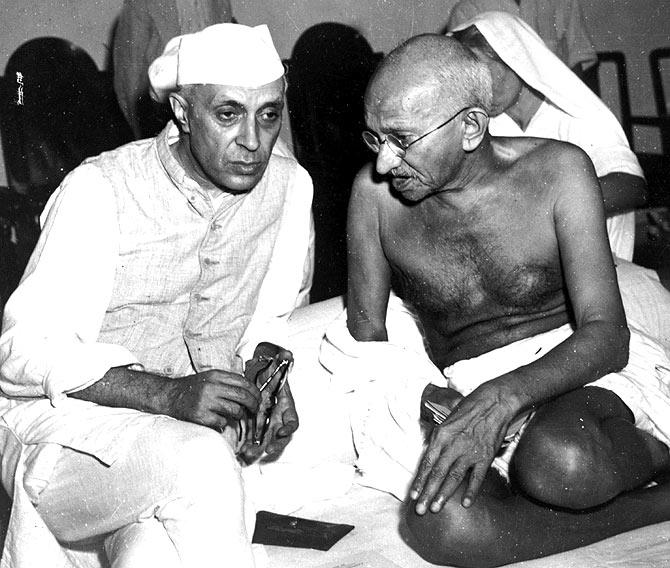
In October 1945, Gandhi wrote to Jawaharlal Nehru, who was opposed to the ideas of Hind Swaraj, 'I fully stand by the kind of governance which I have described in Hind Swaraj... If I were the only one left who believed in it, I would not be sorry... I believe that if India, and through India the world, is to achieve real freedom, then sooner or later we shall have to go and live in the villages -- in huts, not in palaces... I have not the slightest doubt that but for the pair, truth and non-violence, mankind will be doomed.'
I suspect Guha chooses to neglect Gandhi's ideas and his inner life because he wants to present Gandhi as someone acceptable to our modern world.
Gandhi rejected all that embodies the modern and hence his ideas strike many -- as they did Nehru -- to be backward looking.
Guha's refusal to engage with Gandhi's ideas is matched by his decision not to engage with the views of other historians and scholars who have written on Gandhi.
This is sad since some of the best historians and scholars of India have written on Gandhi -- Ranajit Guha, Partha Chatterjee, Ashis Nandy, Sumit Sarkar, David Hardiman, Rajmohan Gandhi, Akeel Bilgrami to name the most prominent.
Instead, Guha engages with the diatribes of Arun Shourie and Arundhati Roy, and spends a couple of pages discussing the appearance of Gandhi on the cover of Time magazine.
Are these of any consequence for our understanding of Gandhi?
Where precisely is Guha's assessment of Gandhi -- as a leader, as a human being?
I am not sure there is a clear statement. The biographer's intent seems, again, to let his enormous accumulation of detail do the speaking.
A biography attempts to place the individual in the context of his times.
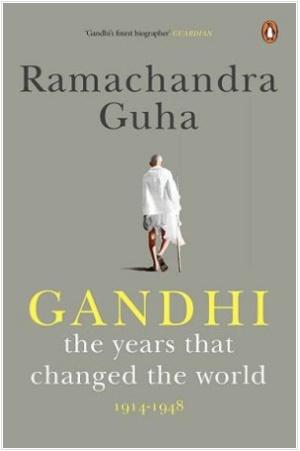
The sub-title of Guha's book -- 1914-1948: The Years that Changed the World' -- promises this. Yes, the world changed dramatically and radically during these years -- the two wars, the Russian Revolution and the rise of socialism, the coming of the Cold War, the end of the British Empire and so on.
But how much of these changes were affected by Gandhi and how was he in turn affected by them?
India changed over these years, but did it change in the direction that Gandhi wanted and desired?
Had he lived, would he have been able in all good faith to go back to that old woman in Dehwan to say swaraj had been won?
Such questions hover over Guha's outstanding narrative. Independent India has to live with the fact that Gandhi did not celebrate India's independence.
I must confess that my admiration for the stupendousness of Guha's achievement in relation to detail is tempered by not a little disappointment at this biography leaving me wanting a richer understanding of Gandhi's inner life and ideas.


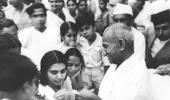









 © 2025
© 2025